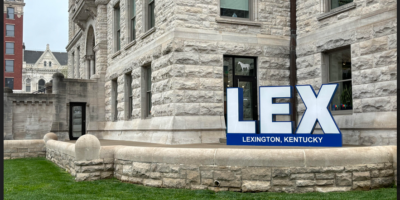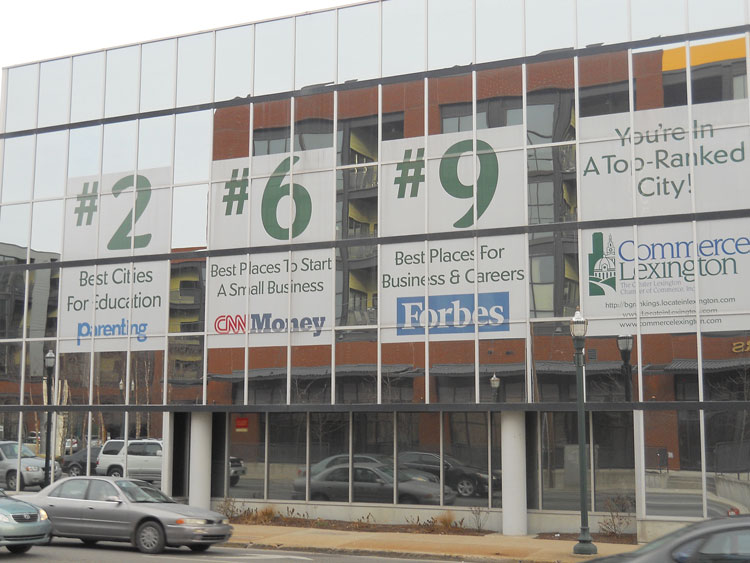Bloomberg bust, part 2
By Mary Grace Barry
Editor’s note: In part one, Mary Grace assessed the shortcomings of Lexington’s entry in the Bloomberg Mayors Challenge. Here, she examines what that proposal says about how the city sees itself.
Well, we didn’t win. Twice.
Lexington didn’t come out as either the “fan favorite” in the Huffington Post’s people’s choice for the Bloomberg Mayors Challenge or as a real winner chosen by Bloomberg Philanthropies. Bummer.
Who did win? The fan favorite was Houston, which proposed the next advancement in curbside recycling. Milwaukee came in second with its idea of turning vacant and foreclosed lots into spaces for urban food production. Of the 58,000 votes cast, Houston pulled in 15,000 and Milwaukee 13,000. Both projects will receive a boost with coverage and promotion from the Huffington Post; in addition, Houston will receive a $50,000 in-kind grant from IBM to implement its project. (Houston also won one of the $1 million Mayors Challenge innovation prizes.)
The big winner, though, was Providence, RI, with its “Providence Talks” program. Bloomberg Philanthropies awarded it the $5 million grand prize in the challenge. From Providence’s winning pitch:
“By their fourth birthday, children who grow up in low-income households will have heard thirty-million fewer words than their middle- and high-income peers. Providence Talks solves this problem, for good. Children need to hear approximately 21,000 words per day for their vocabularies to develop at an appropriate pace. But research has shown that children growing up in less affluent homes hear significantly fewer words each day than their peers in middle and high-income households.
“This word gap quickly adds up. In fact, by the time a child growing up in a low-income household reaches their fourth birthday, they will have heard 30 million fewer words than their peers in middle- and high-income households. Providence Talks—a free, confidential and completely voluntary early intervention program—is our plan to solve this national challenge, starting right here in Providence.”
To me, Providence’s proposal is an interesting one in that it combines issues related to education and socio-economic status with a seemingly simple and elegant approach: engage children in language more, something caregivers can do relatively easily if they are aware of it. As a program that represents a city, its needs, and its vision, the proposal also admits the city’s own deficiencies—something that it would behoove Lexington to confront directly with “bold and innovative ideas,” to borrow the parlance of the contest proposals.
Concrete conditions and needs
Providence’s proposal admits that there is poverty in Providence. According to the Census Bureau, the percentage of persons below poverty level in Providence County, which includes the city, was 16.2 from 2007-2011. For a Kentucky comparison, the Lexington-Fayette County the rate was 17.9 percent and the Louisville-Jefferson County rate 17.5 percent during that same period. (In terms of county population, Providence and Jefferson Counties are closer in size—both around 600,00—and Fayette County is half that with 300,000 residents.) All three counties come in above the national rate for persons below poverty level, which was 14.3 percent from 2007-2011.
That Providence recognizes it’s own poverty may seem like an uninspired observation, but it points to a city that sees its biggest contribution to national urban innovation as remediating economic and educational disparities, which is incredibly important for all of us. As these disparities often also fall along racial, ethnic, and cultural lines this idea addresses (in theory) some of our nation’s most enduring problems.
Not all of the top 20 finalists had the same priorities. While a good number were addressing various symptoms of poverty, several—our city included—were more focused on methods of data collection for the city. If you remember, Lexington’s pitch was for CitizenLex.org, a “knowledge management system” that would gather information and ideas for initiatives in the city. It is an idea that sees the big needs of the city abstractly—as data—and the concrete needs of residents as the smaller potatoes.
(Lexington’s original proposal prioritized funds for the website and personnel for CitizenLex.org; smaller portions of the funds would go to smaller-scale projects like The Better Bites food program, the Fayette County Schools Delivery-to-Diploma program, and more bike lanes and walking trails.)
In other words, conceptually CitizenLex.org presents Lexington-Fayette County as kindof, um, generic.
What’s wrong with generic?
That’s a valid question. As I pointed out in my last article, Lexington’s wasn’t the only proposal for an upgraded information system, and, in fact, Chicago’s more generic “SmartData Platform” won one of the $1 million prizes. (At least we had a better name for our system.) And, one of the conditions of the contest was that idea be replicable in other cities, so something abstract like a knowledge management system makes sense in that regard.
The thing is, Lexington is markedly different from some of the other cities that put forth data-junkie proposals like Chicago, Boston, and Cincinnati. Size, history, and culture are the most obvious differences. The other is that those cities, because of their size and history, have a clear and multifaceted sense of who and what they are and have been. They have been Polish, Italian, Irish, and German immigrants; they have been railroads and meat-packing plants; they are and have been machine politics and race riots; they are and have been Lake Michigan, the Atlantic Ocean and Boston Harbor, and the Ohio River. Being generic in this one sense really doesn’t hurt them.
Now, before you local history buffs and city promoters start sputtering, hear me say this: Lexington, of course, does have a history and is self-consciously aware of that history. But the way that history is presented minimizes the depth and valences of our place and its past—which is, of course, also its present. Mostly, we just get the horses, bourbon, Civil War, and Lincoln mantra. That’s what is talked about and trumpeted. Our historical and contemporary racial situation is largely obscured; as are historical and current waves of immigration; as are, until relatively recently, waterways and environmental impact. These things, as much as Lincoln and bourbon, have helped determine the character of our city.
So, to say that our city’s most innovative idea is a knowledge management system is to say that we really don’t know who or what Lexington is. It’s to say we’d rather be on the bandwagon parroting the business-speak about “innovation” than to address, in a major way, the character of our city and county. And being on that bandwagon makes us appear generic.
Why not envision, become, and trumpet ourselves as the most racially and ethnically progressive city in the South? Or the most-forward thinking region for the connections between obesity reduction and sustainable agriculture? Or as having the smallest carbon footprint in the southeast?
Doing any of these things in a big way—a way big enough to win the Bloomberg Mayors Challenge—would recognize our current deficits, their historical roots, and show a city with depth and gumption. A knowledge management system, not so much.





Leave a Reply